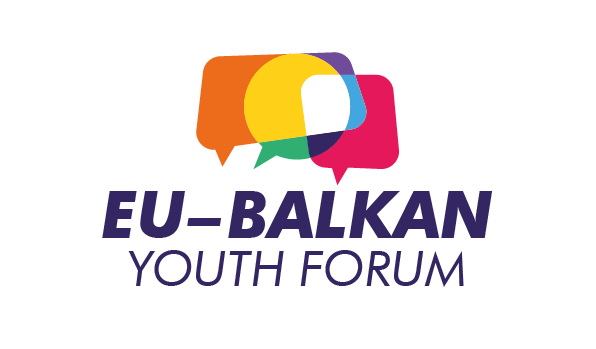The EU-BALKAN YOUTH FORUM
- 4 days-conference with a strong media coverage and high visibility
- 78 youths, Western Balkans and EU nationals, involved and empowered to disseminate their experience
- Conference proceedings to be delivered to the Conference on the future of Europe
- 1 transnational EU-Western Balkans Youth Network launched
Background
EU Enlargement has become more and more entangled with the issue of external relations in general and the future of the EU in particular. Although the European Council of Salonika in 2003 clearly set out a linear future for the Balkan countries, with the invitation to accede to the EU, skepticism has grown with time on the possibilities of successful integration. Continuous challenges to democratic transition in the Balkans and doubts on how to couple enlargement with deepening, together with debates on the rule of law inside the EU, have increased questions on EU integration.
In the meanwhile youth in the Balkans seems to be growing disenfranchised towards political institutions, while frustration is mounting regarding the possibility to enter the EU, which is perceived as a moving target. Many young people from the Balkans abandon their countries looking for a new life elsewhere, to fulfil their life goals. While the political process is stagnating, therefore, a spontaneous, individual, bottom-up process of self-integration is taking place, which however is developing without guidance or interaction with political institutions. At the same time, inside the EU, Balkan integration and the future of Europe are not perceived as linked matters by the wider public and policy makers have not yet signaled willingness to face them in a holistic approach.
Based on a proposal of the Italian Foreign Minister Luigi Di Maio, the EU-Balkan forum called for by the Regional Cooperation Council (Sarajevo), the Regional Youth Cooperation Office (Tirana), the Study Centre for International Politics (Rome) and Osservatorio Balcani Caucaso Transeuropa (Trento) and funded by the Italian Ministry of Foreign Affairs and International Cooperation is an opportunity for youth from the entire continent to discuss common issues, face policymakers and mobilize new energies from below, facilitating the emergence of a young transnational network to engineer new initiatives and bring about fresh views on both the EU and Balkan integration
The Forum will also channel its conclusions to the “Conference on the Future of Europe” launched by the EU for 2021-2022, to allow citizens from across the continent to submit their views on the future of the EU.
The Italian Ministry of Foreign Affairs and International Cooperation help the participants start new projects after the Forum, with a view to realize effective initiatives in bringing together networks from different countries across the EU and the Balkans and address the issues that stand in the way of further integration.
Dates and Venue
22-26 November, in Rome.
The event will be held in person and participants will need to provide proof of vaccination against COVID-19. All health safety measures and distancing will be in place.
Participants
Two university students for each of the 27 UE Member States and four from each of the Western Balkans 6 countries. Working Language is English.
Participants will receive air tickets and full board treatment.
Applications
The deadline for applications is October 15th
Forum topics and agenda
The discussion will be based on five working groups, all connected to the question “What Is Europe?” i.e.: how do we define it, how do we decide what is “identity”, who is in and who is out, what are the common values?
Each working group will specifically address a central question, as in the following scheme.
What Is Europe?
Group 1
The New EU between governmental cooperation and democracy from below
How to couple deepening and enlargement?
What role can the Balkans play in this?
Group 2
“United in diversity, beyond past wars”
How to build a shared memory of the past and facilitate cooperation among peoples and countries?
Is reconciliation in the Balkans possible?
Group 3
One continent, one environment
How to organize environmental protection and the fight against climate change at continental level?
What role for the Balkans? Is it a complementary or competitive approach?
Group 4
One market, many challenges
How to build economic integration and take into account people flows inside and outside the area both of local workers and foreign immigrants?
Is it better to create stepping stones for further economic integration with the Balkans or to go for a “Big Bang” approach?
Group 5
Many societies, one virtual space
Is the Internet helping or hindering the creation of common society at EU level?
How to use new technologies in this field?
Is democracy threatened or strengthened by the new tools?
Each working group will elect two co-chairs, one from the EU and one from the Western Balkans 6, in order to facilitate the debate and to present the conclusions in the plenary session on the last day, which will be chaired by a President elected by all the participants.
Working groups will be assisted by mentors, who will facilitate discussion by providing info and data, yet without guiding the participants towards pre-fixed conclusions.
Italian Foreign Minister Luigi Di Maio will attend the event and interact with the participants. Other high level attendees are also invited.
Further projects and follow up
In order to ensure appropriate follow up the Italian MoFA, together with other institutions, will set aside key basic funding for transnational projects in the main areas of discussion, to be elaborated and presented by the participants after the Forum. Projects should focus on the environment, youth start-ups, civil society, training, democratic engagement. Basic prerequisites will be the presence of both a trans-national and EU-Balkan element (at least two EU Member States and two Western Balkans 6 States).




